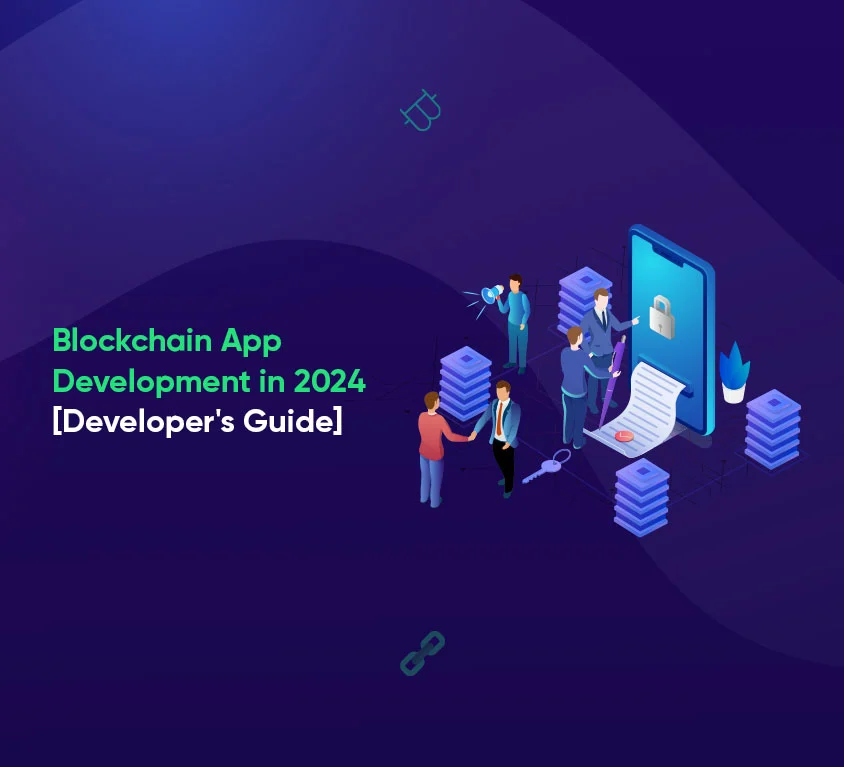
Introduction
Blockchain & Web3 Services Trusted By Leaders
- Develop innovative solutions using our state-of-the-art blockchain expertise.
- Achieve accelerated growth with robust & scalable Web3 consulting.
- Unlock 360-degree security with our top-rated blockchain development.
Blockchain App Development in 2024 – Comprehensive Guide
Blockchain technology is more than just a catchphrase; it has generated a lot of buzz in the industry. This technology is a digital ledger that records transactions securely and transparently. It renders records and transactions impervious to cyberattacks. Moreover, blockchain has advanced significantly in 2023. There’s no indication that the talk about cryptocurrencies and blockchain technology will go away any time soon, whether it’s on news channels, social media, or in-office group discussions. With this guide to blockchain app development, we hope to assist you with every significant technical and commercial facet of the technology. This guide will explore blockchain development in 2024, focusing on its applications in healthcare, real estate, and finance. It discusses emerging trends like Central Bank Digital Currencies, Metaverse developments, and NFTs. It provides steps for custom blockchain app development.What are Blockchain Apps?
Blockchain apps are software apps that are developed on a blockchain network, also known as decentralized applications (DApps). They have decentralized and unchangeable characteristics of blockchain technology as they function through smart contracts, and self-executing code kept on the network. These apps offer safe and impenetrable transactions, do away with the need for middlemen, and increase transparency. Software apps of blockchain mainly run on desktop and mobile. Blockchain mobile apps refer to applications designed for mobile devices (such as smartphones and tablets) that leverage blockchain technology. These apps can provide various functionalities, taking advantage of the unique features offered by blockchain networks. Here are some common types of blockchain mobile apps:Common Types of Blockchain Mobile Apps
Following are the mobile applications that take advantage of blockchain’s decentralized, transparent, and secure features to provide creative solutions for a range of use cases and industries. From their mobile devices, users can engage with blockchain networks, manage digital assets, and take part in decentralized ecosystems.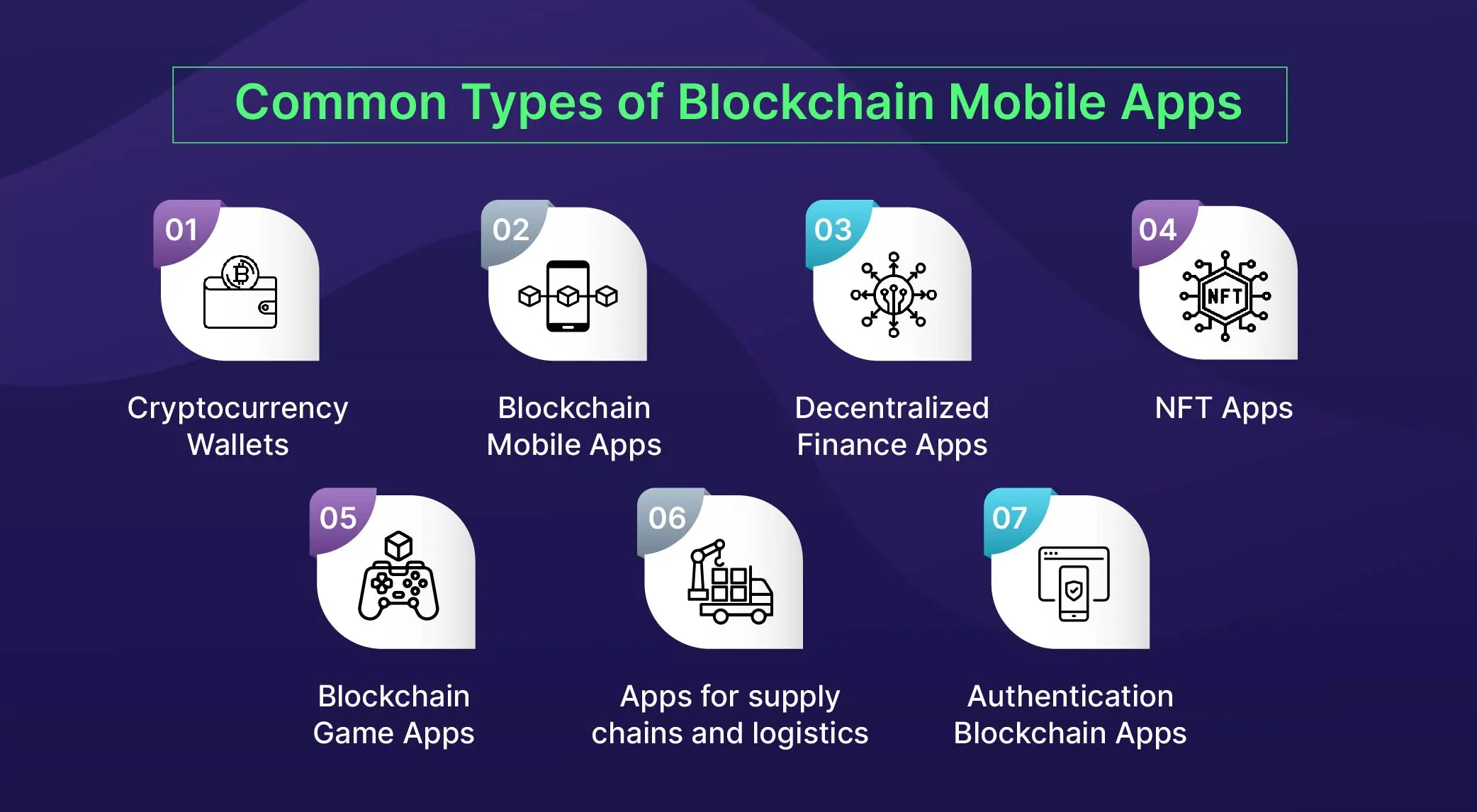
- Cryptocurrency Wallets: Digital wallets that let users securely store, send, and receive cryptocurrencies on their mobile devices are known as cryptocurrency wallets.
- Blockchain Mobile Apps: These are applications that use decentralized, encrypted communication protocols on the blockchain to improve messaging security and privacy.
- Decentralized Finance Apps: These are mobile applications also called DeFi Apps that let users use their mobile devices to access decentralized financial services, such as trading, yield farming, lending, and borrowing.
- NFT Apps: Apps that make it easier to create, buy, and manage non-fungible tokens (NFTs), which stand for distinctive digital assets like virtual real estate, art, and collectibles.
- Blockchain Game Apps: These are mobile games that use blockchain technology to offer features like tokenized in-game assets, provably fair gameplay, and asset ownership.
- Apps for supply chains and logistics: These are programs that make use of blockchain technology to improve supply chain management’s traceability and transparency by letting users monitor the origin and legitimacy of goods.
- Authentication Blockchain Apps: Mobile apps that use blockchain technology for safe identity management and authentication are known as identity and authentication apps. These apps give users more control over their data and lower the risk of identity theft.
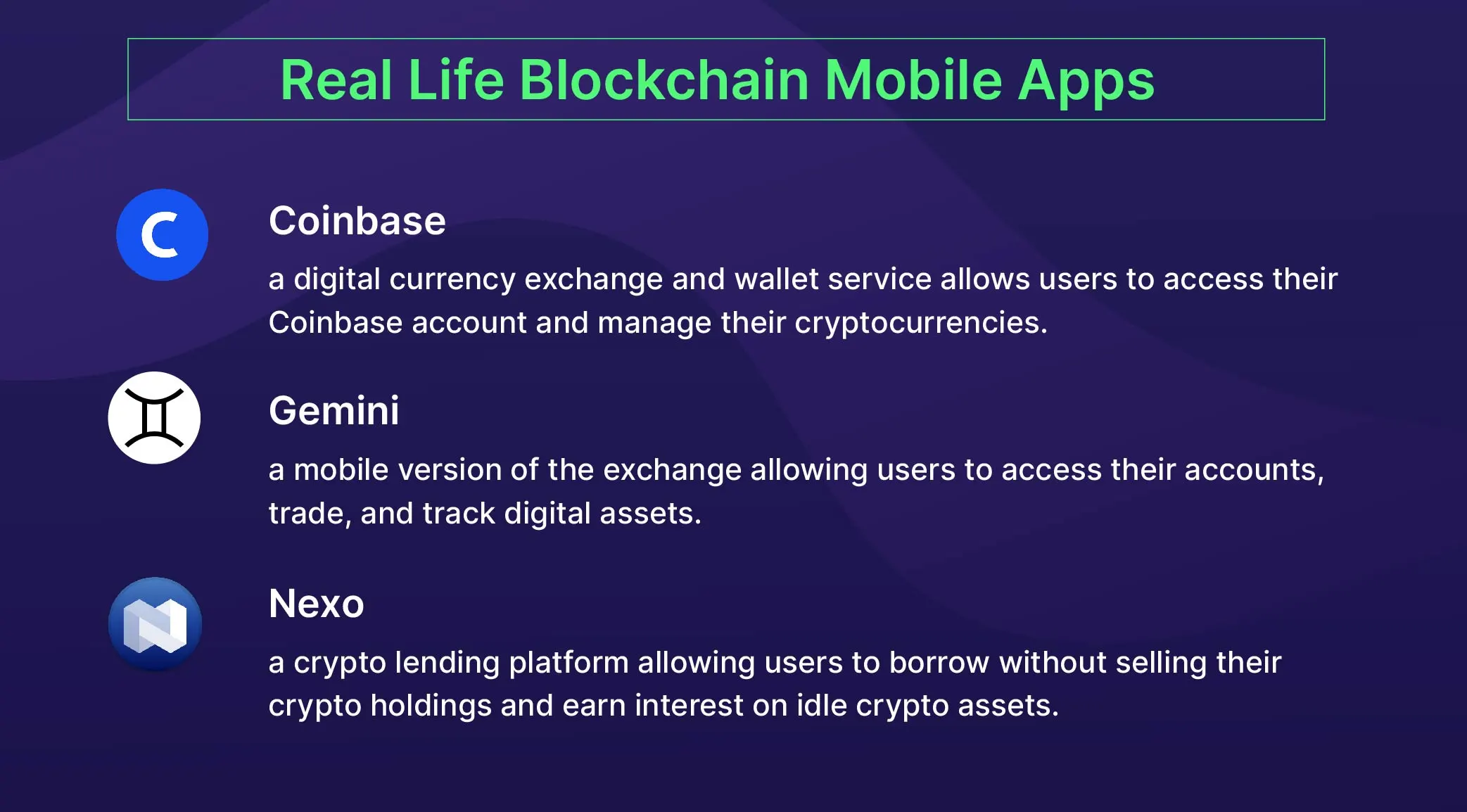 Thus, from a business perspective, blockchain functions as a peer-to-peer exchange network. Watch this video to gain a better understanding of how blockchain technology functions:
Thus, from a business perspective, blockchain functions as a peer-to-peer exchange network. Watch this video to gain a better understanding of how blockchain technology functions:
How to Develop a Blockchain Application? A Complete Process
It is essential to know why blockchain is required before knowing the process of blockchain application development. Blockchain provides high security, various uses, and ease of use. That is why it is used for various purposes, such as managing finances, tracking goods, protecting medical records, and increasing voting security. Furthermore, they eliminate the need for middlemen like banks, enabling faster and less expensive direct asset or money transfers. Additionally, blockchain mobile apps are user-friendly, making them accessible to ordinary people without requiring IT expertise. Now, let’s learn the steps to develop a blockchain application.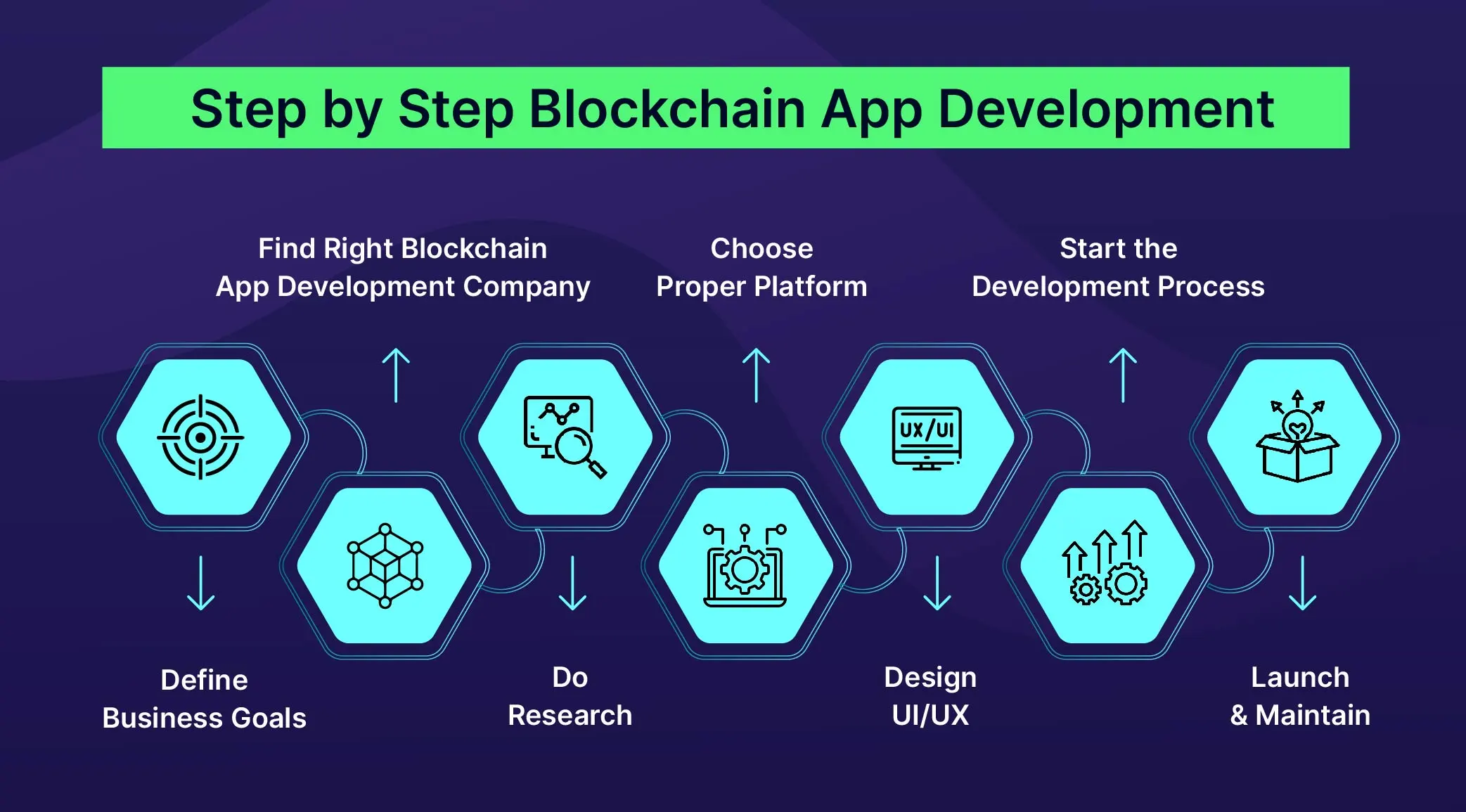
1. Identify the Needs for Your Business
Determining your business requirements and organizing the entire blockchain app development process are the first steps. Companies should be aware of their goals and the reasons behind developing an app. Business owners and executives should investigate the following queries;- What motivated you to create a blockchain application?
- Does a blockchain solution fit your business needs?
- Which areas stand to gain from greater accountability and transparency?
- How can you use blockchain technology to your advantage to become a leader in your field?
- Which particular features and functionalities are you hoping to incorporate into your blockchain application?
2. Look for the Best Partner for Blockchain App Development
You can check our list of the top blockchain companies providing consultancy for app development to locate the ideal blockchain mobile app development partner. Before hiring, you should review all of the company’s details. Additionally, you ought to search for a particular blockchain development company based on your needs. For example, you should find a company that has experience creating games using blockchain if you want to develop a gaming app that is enabled by blockchain. Likewise, you ought to assess your blockchain development partner’s background in various sectors, including banking, education, and healthcare.3. Conduct Competition Analysis
- A key component of the blockchain app development process is competitor research, which aids companies in locating and evaluating their rivals.
- Businesses can learn about the strategies, market share, client base, and other important aspects of their competitors by carrying out efficient competitor research.
- This data can be utilized to develop a special value proposition and set their blockchain app apart from rivals.
- Additionally, competitor analysis can assist companies in recognizing market opportunities and possible risks, empowering them to decide on the best course of action for their blockchain mobile app development.
4. Select the Right Blockchain Platform
It’s time to select the best blockchain development platform now, as this will affect the app’s functionality and efficiency. The platform you select ought to be scalable, safe, and appropriate for your company’s requirements.5. Create the UI/UX
Beginning the design phase with creating a visually appealing and intuitive user experience (UI/UX) for the app is essential because it makes navigating around it easier for the user. It should be simple to use, visually appealing, and easy to navigate when designing the UI/UX. An effective UI/UX can draw in and keep users, which will increase the app’s success. When creating the UI/UX and making sure the app’s design is in line with the business goals, keep the target audience in mind.6. Begin the Process of Development
- Step 6 of the roadmap includes; developing a blockchain app. Begin working on the app’s MVP, or minimum viable product, which should include all of the fundamental features and capabilities.
- Once the MVP has been developed, begin testing it with a group of your staff members. Once it functions properly, you can begin integrating all necessary features into your application.
7. Launch & Maintain
You can release your app online based on the intended market once it’s ready. Making sure your final product complies with the guidelines and policies of the Google Play Store and Apple App Store is another important task that you must do. The last step is not to launch the app. You should keep your app updated and maintain it to assist users in streamlining their tasks and increasing productivity. This guarantees that your app is operating in line with market standards and is up to date.Benefits of Blockchain Applications
Blockchain app development offers the following benefits and helps build trust between companies in different industries;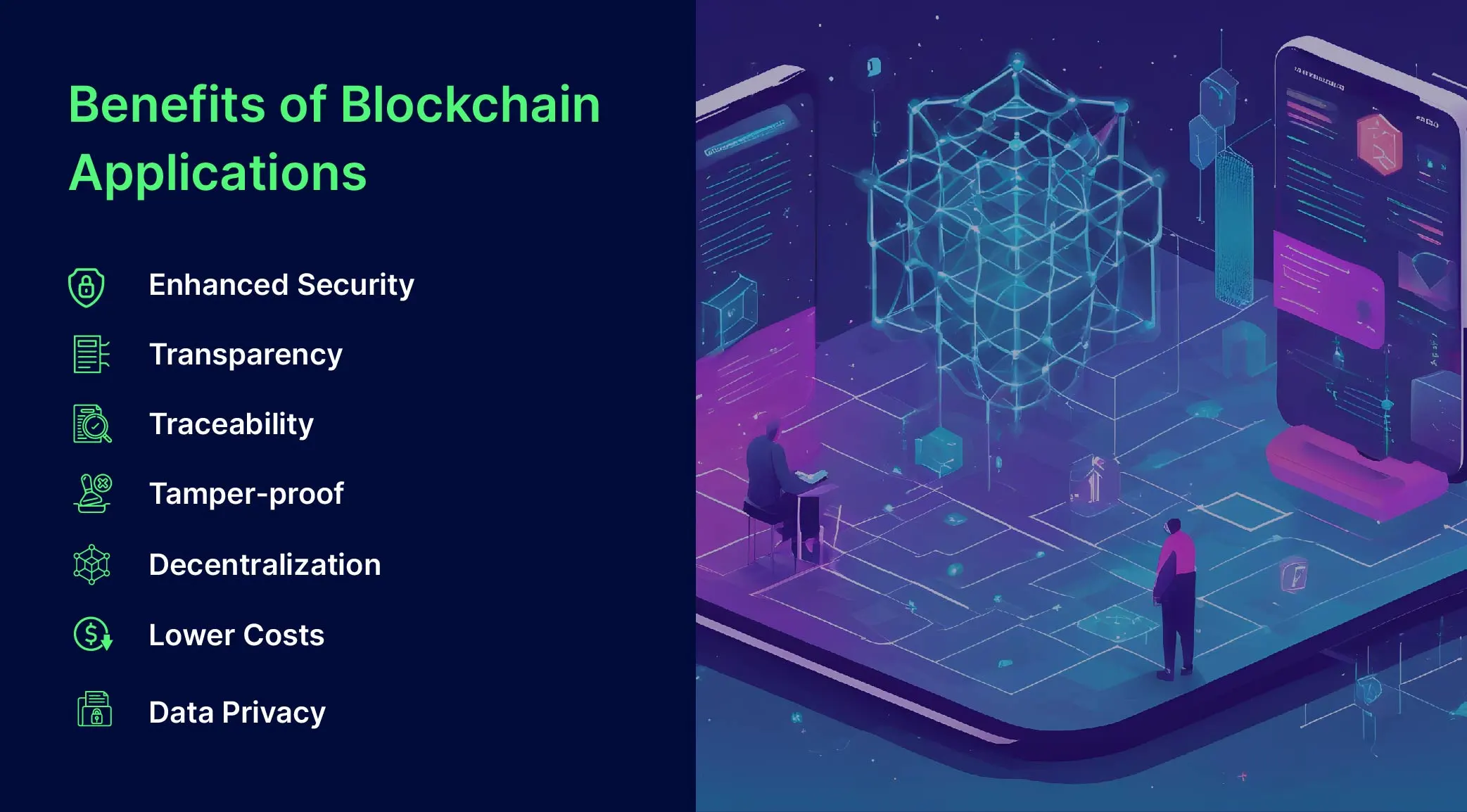
- Enhanced Security: To protect data and reduce the possibility of tampering and unauthorized access, blockchain app development uses cryptographic techniques. Because of this strong security framework, it is difficult for hostile actors to compromise transactions, protecting the app’s data integrity.
- Transparency: The intrinsic transparency of blockchain app development is a key advantage. Every transaction made through the app is accessible to everyone on the blockchain network. Because of this transparency, users are more likely to trust the application, fraud is less likely to occur, and accountability is maintained throughout.
- Traceability: Developing blockchain apps makes it simple to keep track of goods and assets through the supply chain. With the help of this traceability feature, users can learn more about the provenance and path of products, which increases app trust and accountability.
- Tamper-proof: Data stored on a blockchain application is unchangeable. A tamper-proof record is ensured by the decentralized ledger, which makes it nearly impossible to change or remove transactions. Applications that demand the highest level of record integrity will especially benefit from this feature.
- Decentralization: Since blockchain applications are developed on a decentralized network of nodes, central authority control is not necessary. By reducing the possibility of manipulation, decentralization contributes to the creation of a trustless environment in which participant consensus validates transactions.
- Lower Costs: Blockchain app development automates processes when predetermined conditions are met by utilizing smart contracts. The application and its users will save money as a result of this automation, which also expedites transactions and eliminates the need for middlemen.
- Data Privacy: Users have more control over their data thanks to blockchain app development. Users have control over what information they disclose and to whom. In traditional digital platforms, this kind of ownership and privacy protection for data is frequently absent. Enhanced privacy features for blockchain applications are specifically provided by private and permissioned blockchains.
Languages to Consider for Blockchain Applications
To develop a scalable blockchain app, you need to choose the right tech stack. A blockchain app is a combination of several programming languages, databases, middleware, APIs, and more. The following languages are considered good for developing a blockchain mobile application;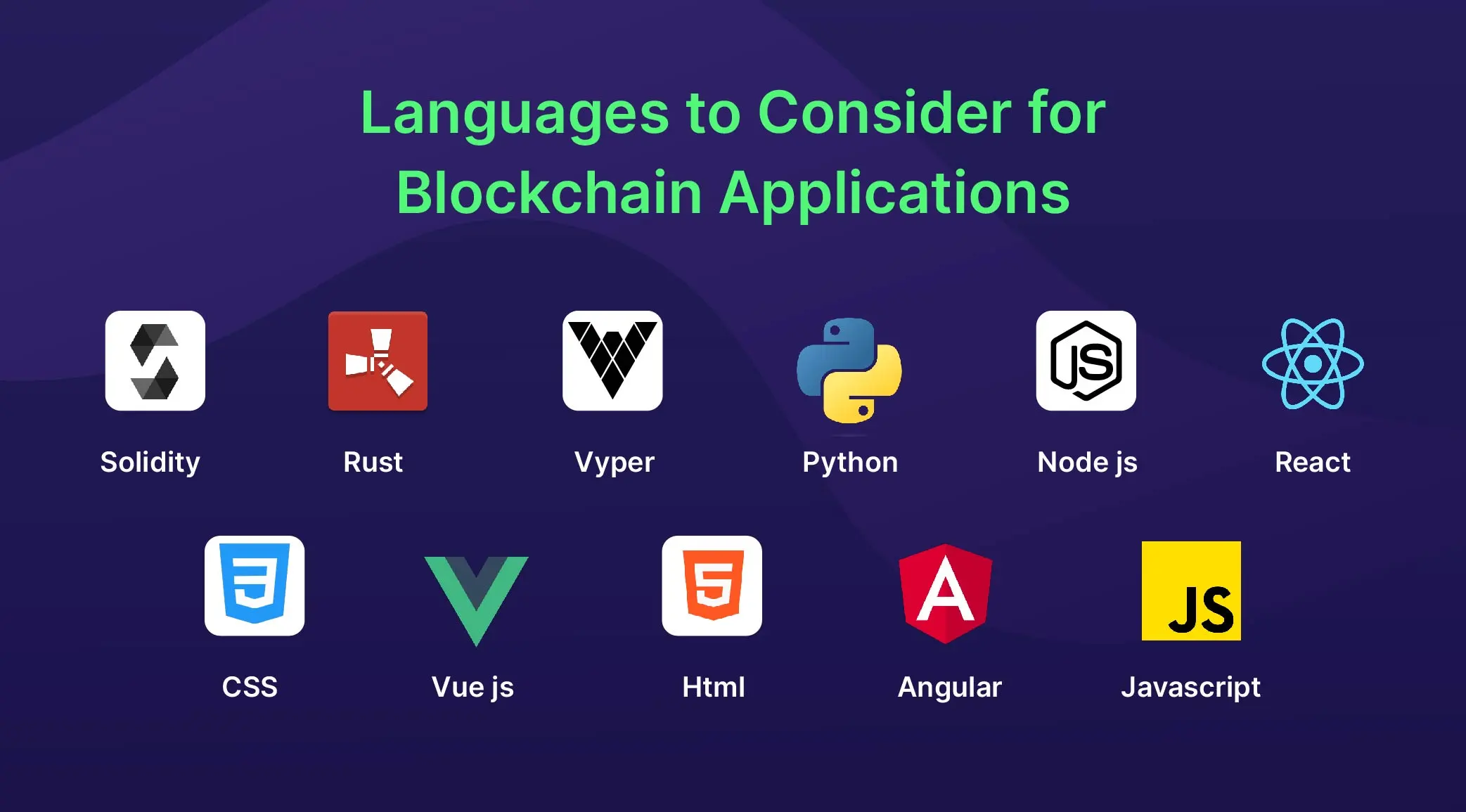
Blockchain App Development Platforms
Ethereum Blockchain
- One of the most notable and well-known blockchain systems.
- It provides a truly decentralized blockchain that is comparable to the Bitcoin network.
- Its primary benefit, according to its developers, is that it facilitates complete decentralization and supports smart contracts.
- A significant number of technologists have embraced the Ethereum platform to develop decentralized apps, or dApps, on the network.
EOS Platform
The EOS blockchain technology is an open-source project, proposed to create smart contracts and decentralized apps. Supporters of the project claim that it has an advanced proof of stake consensus mechanism that outperforms older ones like Ethereum. Additionally supported is a governance component that lets users vote on changes to the platform.IBM Blockchain
- For business clients who prefer not to take chances, IBM Blockchain is a top-performing, distributed, and secure blockchain network.
- Its principal benefit over other decentralized networks is that it connects to commercial clouds and legacy systems more easily.
- The IBM Blockchain developer tool was designed with customization, functionality, and adaptability in mind.
- IBM has also invested in creating an intuitive interface to expedite critical processes such as configuring, testing, and swiftly deploying smart contracts.
Hyperledger Fabric Blockchain
A suite of tools called Hyperledger Fabric is used to create blockchain applications. It is a modular system with numerous components that function well together. It works well with private blockchains, which have the potential to increase security and speed. Furthermore, it is capable of handling various data model types, including the account and UTXO models.Stellar Blockchain
- Stellar is a more modern blockchain variant that was created for a range of DeFi applications.
- It uses the Stellar Consensus Protocol, and transactions on open blockchains proceed more swiftly.
- It also has security measures to stop criminals from engaging in commercial transactions.
- Businesses frequently use Stellar for cross-border payments and money transfers.
- It’s a creative way to improve the efficiency and safety of financial transactions.
How much time and cost is required for blockchain app development?
It is difficult to precise estimations for blockchain app development because project requirements widely vary. However, we will provide you with a broader guideline based on standard industry factors and estimations; Several factors play a great role varying costs and time of blockchain app development:| Factor | Impact |
|---|---|
| Development Team | Hourly Rates can vary from $50 to $200 per hour, depending on the experience and location of the team. |
| Platform for Blockchain | Developing on a public blockchain network may be less expensive at first than on a private or consortium blockchain, but continuous transaction fees may drive up long-term costs. |
| Testing and Audits | At least 20–30% of the entire development cost should be allocated to the budget. It is essential to guarantee the blockchain application’s security and integrity. |
| Ongoing Maintenance | Annual cost typically involves 20-30% of the initial development cost for ongoing maintenance and potential upgrades. |
| Aspect | Estimated Time | Estimated Cost |
|---|---|---|
| Basic Blockchain App | More than 1 month. An example would be a simple cryptocurrency wallet app development with minimal transaction features. | $10,000 – $50,000. An example of a basic blockchain application would be a token wallet app. |
| Complex Blockchain App | Several months to a year or more. An example is a Defi app would integrates with various protocols, and has sophisticated security features and smart contracts functionality. | At least $50,000 to $500,000. An elaborate supply chain management system built on blockchain technology, featuring real-time tracking, sophisticated smart contracts, and system integration with other platforms. |